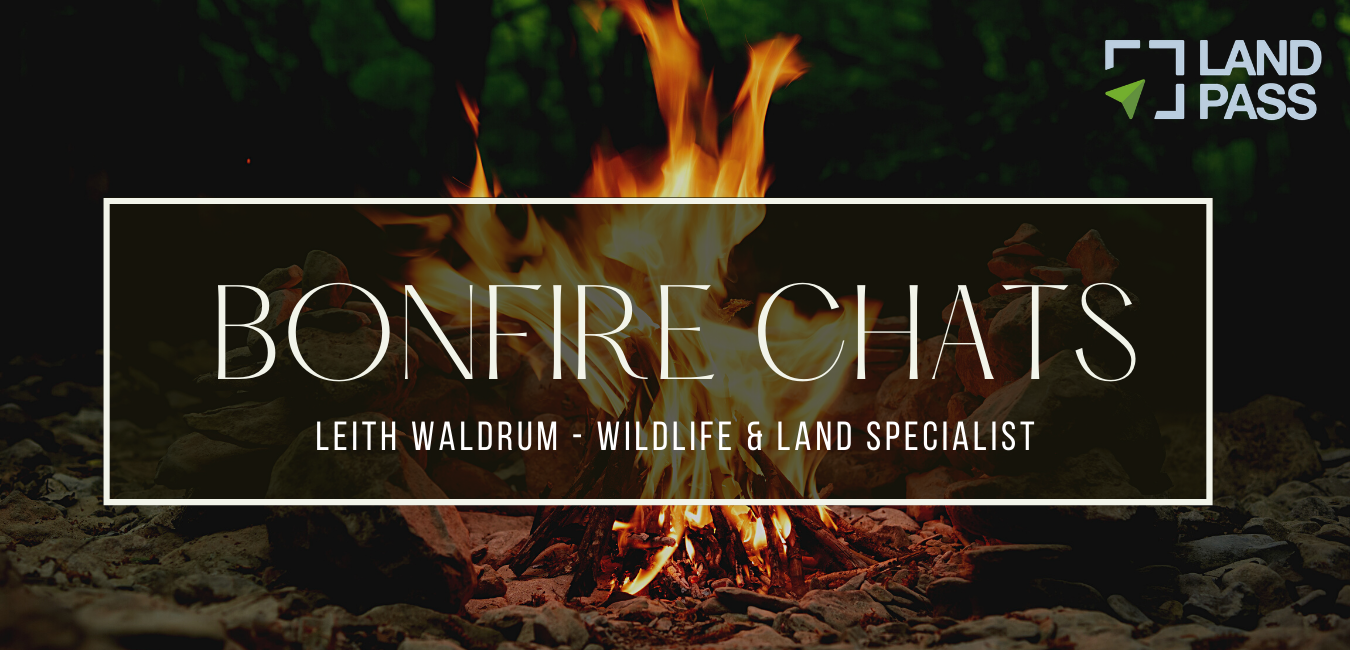Welcome to our first edition of Bonfire Chats! This is a series where we interview hunting, fishing and outdoor experts to understand how they got into the role they’re currently working in. We’ll also take a deep dive into useful tips for those who are new to hunting and fishing, personal stories and anecdotes. Today’s interview is with Leith Waldrum, our Land Management Specialist. Let’s get into it!
Can you tell us a little about how you were introduced to hunting and/or fishing?
Well, for as long as I can remember, I’ve loved to fish. My dad often reminds me how much I loved it growing up, telling stories of me in diapers with a fishing rod in hand and having to force me off the dock at our family cottage to go inside for dinner. Hunting was a different story. It came later in life because nobody in my family really hunted, at least not since before I was born. I got interested in hunting when I hit my mid-teens and got my license when I turned 18, starting with turkeys. Since then I’ve continued to learn more about hunting and the outdoors. That’s one thing I love most about the outdoors, there’s always something new to learn or see!
Do you have an educational background related to the outdoors? If so, what is it?
Yes, I do. I studied Ecosystem Management and Arboriculture at Sir Sandford Fleming College.
What do you like to hunt?
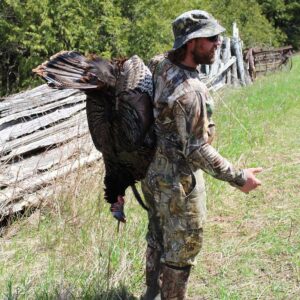
That’s a tough one! Each season is special to me and I enjoy hunting year-round. If I had to choose one, I’d have to say spring turkeys. There’s just something about hunting in the spring air. The hunt itself is also exciting and it can be hard to keep your heart rate down when you hear a gobble ring out close by!
What does land management for LandPass entail?
Working as a land management specialist for LandPass involves many aspects. I evaluate and assess the landowner’s properties to make sure the hunter will find value in choosing their land to hunt on. That typically means I look at game numbers, species and which habitat requirements are met or aren’t. I also take a look at accessibility for the hunter, possible setup locations, predominant wind directions and any other aspects that may come into play when determining how huntable a property is. Pricing land can sometimes be tricky for the landowner, so I help them determine a price based on the value of their land. I also walk them through how much land access they’d like to provide, how valuable the game and habitat would be to the hunter, as well what group sizes would be appropriate for safety and effective hunting purposes. Of course, there’s a lot more that goes into the role but that’s a basic rundown.
How has working in land management changed this year due to the pandemic?
It’s hard to determine if there’s been much of a change. Obviously, there have been travel issues, as far as leaving my health unit and whatnot. Some of my work is done remotely and some involve being at a property to inspect the land. Depending on the landowner, much of that can be done with little to no close contact. Other than extra precautions as far as PPE goes and limiting my travels from property to property, it’s been fairly easy to continue doing my job.
What are some things you do to prepare for a hunt?
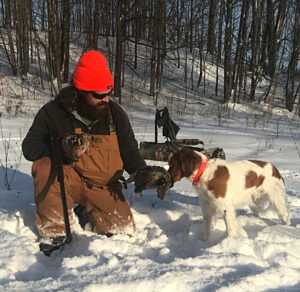
Well, it really depends on the time of year, weather conditions and what species I’m hunting. I typically make sure I have the right clothing on hand to keep me warm or cool and dry. Equipment maintenance is a big one. If I’m bowhunting, I make sure that I’ve been practicing and shooting well. With firearms as well, I make sure that everything is sighted in and working properly. For big game hunts, I take a look at the weather, wind directions and go back through years of notes to try and find patterns and similarities from year to year. I bring anything that will help me stay comfortable through the duration of the hunt and equipment that will give me a leg up for that specific hunt.
What do you look for when scouting a new property?
Connectivity is very important to me. When I’m scouting a new property, I like to see a larger overall picture of the land. It’s exciting to find travel corridors across multiple properties when first looking at a new property. I want to see signs from animals but I also want to see the potential for access and setup. I’ll run through a checklist: Is there food? Is there water? Is there bedding or roosting areas? Cover? Animal tracks? Those are the main things I’m looking for. For example, if there’s turkey on the land, where do they sleep, eat and where’s the best place to get in between the two spots? Is it possible for me to get there without the animals knowing? Granted that the land meets the habitat requirements of the animals, it should be cleared!
Why should non-hunters give hunting a try?
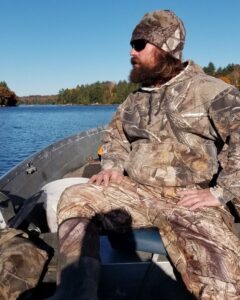
I’ve always looked at hunting as a chance to connect with nature. There’s so much more to hunting than killing an animal. I’ve seen some amazing things over my years of hunting and some of the most memorable hunts didn’t involve an animal. There’s just no better way to connect with nature in my opinion and that’s a huge reason to give hunting a shot. It’s also great when you can harvest organic and healthy meat that comes with the satisfaction of doing it for yourself. The challenge involved is also enticing. You acquire skills you wouldn’t get from any other activity and it teaches you patience, perseverance and self-motivation.
What’s the craziest thing that’s happened to you while hunting?
That’s another tough one. I’ve seen some amazing things while hunting. I’ve seen a hawk grab a chickadee mid-flight, right out of the air in front of me. I’ve also seen coyotes and hawks go after turkey decoys. Some other crazy experiences were when a guy shot a turkey decoy of mine on public land and I was followed out of the woods by three coyotes in the dark one time. They were pretty close to me, I could see them in the dark without a flashlight and I’d be lying if I said I wasn’t a little worried!
How do you go about planning a hunting trip?
Well, if I know the property and have hunted there before, it’s pretty easy. I just get my equipment ready ahead of time and head out! If I don’t know the property, I’ll take a look at maps and try to determine where I want to be on the property and how I’m going to get there. I also plan to bring a first aid kit on every hunt because you never know what could go wrong! Planning a hunt that involves travel requires a lot of detailed preparation. For example, if I’m moose hunting for 10 days, there’s a lot that will go into the trip behind the scenes. I exercise during the off-season so that I’m physically fit and ready for the hunt. Everything from what I pack to what I’m going to do to make the hunt successful are things I think about before I leave for the hunt. I also consider what will happen after the hunt. Where am I taking the meat? How am I going to get the animal out of the bush? There’s a lot you need to think about for a hunt like that. It really depends on what I’m hunting and where.
Where can people follow you, get in touch and learn more about what you do?
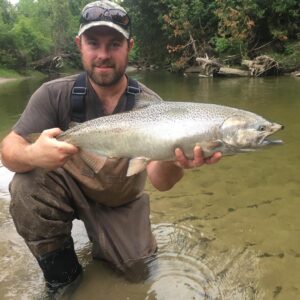
Instagram is the best place to follow me (@lrw_outdoors) or you can also reach me at Leith.waldrum@landpassinc.com. I’m always happy to answer questions and definitely take pride in helping outdoors folks succeed. If I can help a hunter fine-tune their approach or help a new hunter get started, it really makes my day!
